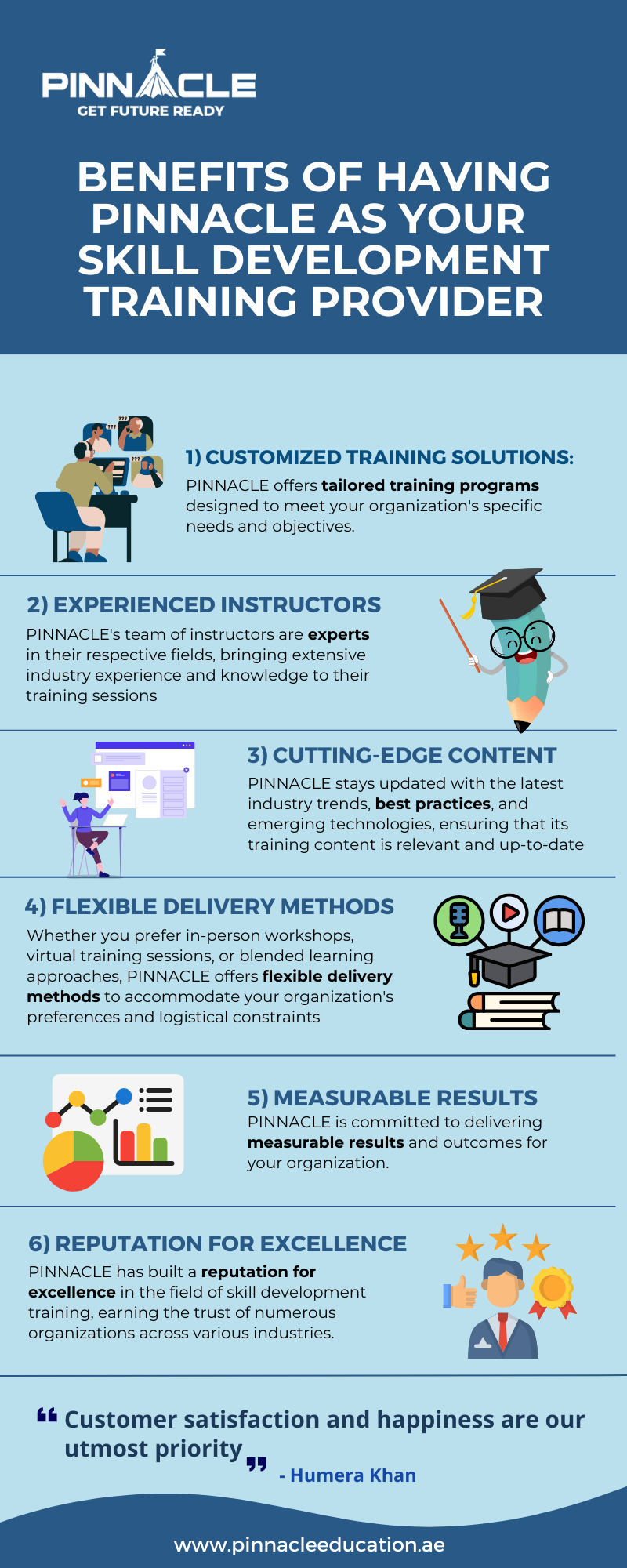What are the benefits of having a Skill Development Training Provider for your organization?
Introduction:
Introducing a Skill Development Training Provider to your organization in Dubai offers tailored solutions to meet the unique demands of the local market. In a city known for its dynamic economy and multicultural workforce, investing in skill development is essential for staying competitive. By partnering with a reputable training provider, your organization can equip employees with the technical expertise and soft skills needed to thrive in Dubai’s diverse business environment, enhancing collaboration, communication, and adaptability.
Furthermore, in Dubai’s rapidly evolving industries such as technology, finance, and hospitality, staying ahead of the curve is imperative. A Skill Development Training Provider offers customized programs designed to address emerging trends and equip employees with the latest tools and methodologies, ensuring your organization remains agile and innovative. By investing in employee development, you not only attract and retain top talent but also position your organization as a forward-thinking leader in the Dubai market, capable of driving sustainable growth and contributing to the city’s vision for the future.
Benefits of having a Skill Development Training Provider for your organization
1. Enhanced Employee Performance:
Training providers offer specialized programs tailored to address specific skill gaps and professional development needs within your organization. By equipping employees with relevant knowledge and skills, they can perform their roles more effectively and contribute to overall organizational success.
2. Increased Employee Engagement:
Investing in employee development demonstrates a commitment to their growth and career advancement. Training programs provided by external providers often incorporate interactive and engaging learning experiences, which can boost employee motivation, satisfaction, and retention.
3. Access to Expertise:
Training providers bring expertise in various areas of skill building and professional development. They offer access to experienced trainers, industry best practices, and up-to-date knowledge, ensuring that your employees receive high-quality training that aligns with industry standards and trends.
4. Cost-effectiveness:
Outsourcing training to external providers can be more cost-effective than developing and delivering in-house training programs. Training providers often have existing resources, infrastructure, and instructional materials, reducing the time and resources required to design and implement training initiatives internally.
5. Customized Training Solutions:
Skill-building and professional development training providers offer customizable training solutions tailored to the specific needs and objectives of your organization. Whether you need leadership development, technical skills training, or soft skills enhancement, training providers can design programs that meet your unique requirements.
6. Flexibility and Convenience:
External training providers offer flexibility in terms of scheduling, delivery formats, and locations. Whether you prefer on-site workshops, virtual training sessions, or blended learning approaches, training providers can accommodate your preferences and ensure minimal disruption to daily operations.
7. Measurable Results:
Training providers often incorporate assessment and evaluation mechanisms to measure the effectiveness and impact of their training programs. By tracking key performance indicators and learning outcomes, you can gauge the return on investment (ROI) of your training initiatives and make informed decisions about future training investments.
8. Stay Competitive:
In today’s rapidly evolving business landscape, continuous learning and skill development are essential for staying competitive
Update yourself with Fresh Industry Trends
In today’s rapidly evolving business landscape, staying abreast of industry trends is crucial for organizational success. Integrating a Skill Development Training Provider into your organization not only enhances employees’ existing skill sets but also provides a platform for staying updated with the latest industry trends. These training providers often offer curated content and modules that incorporate the most current developments, ensuring that employees are equipped with the knowledge and skills needed to navigate emerging challenges and capitalize on new opportunities within their respective industries.
By partnering with a Skill Development Training Provider, organizations can access up-to-date information on market shifts, technological advancements, regulatory changes, and consumer preferences. Through specialized workshops, seminars, or online courses, employees can stay informed about the latest industry trends, best practices, and innovative strategies relevant to their roles.
Furthermore, the integration of real-time industry insights into training programs enables employees to adapt quickly to changes and proactively contribute to their organizations’ growth and competitiveness. Whether it’s understanding the impact of disruptive technologies, anticipating shifts in consumer behavior, or complying with evolving regulatory requirements, employees who are well-versed in current industry trends can drive innovation and strategic decision-making within their organizations.
In summary, incorporating a Skill Development Training Provider into your organization not only fosters skill enhancement but also facilitates continuous learning and adaptation to fresh industry trends. By staying updated and informed, employees can contribute more effectively to their organization’s success in today’s fast-paced and ever-changing business environment.
Skills the Employees Gain when they Upskill
When engaging with a Skill Development Training Provider, employees can acquire a diverse range of skills tailored to their roles, industry, and organizational objectives. Here are several types of skills that individuals may develop through such training:
Technical Skills: These are job-specific skills required to perform tasks within a particular profession or industry. For example, software programming, data analysis, digital marketing, graphic design, or project management skills.
Soft Skills: Also known as interpersonal skills or people skills, these are non-technical skills that enable effective communication, collaboration, and relationship-building. Examples include leadership, teamwork, communication, adaptability, problem-solving, and time management.
Industry-Specific Skills: These skills are specific to a particular industry or sector and are essential for understanding industry norms, regulations, and best practices. Examples include financial analysis in banking, patient care in healthcare, or customer service in retail.
Leadership and Management Skills: Training programs may focus on developing leadership and management capabilities, including skills such as decision-making, strategic planning, conflict resolution, delegation, and coaching.
Digital Literacy and Technology Skills: With the increasing digitization of workplaces, training providers offer courses to enhance digital literacy and proficiency with technology tools and platforms, including software applications, cloud computing, cybersecurity, and data analytics.
Sales and Customer Relationship Skills: For roles in sales, marketing, or customer service, training may cover skills related to sales techniques, negotiation, customer relationship management (CRM), and handling customer inquiries or complaints effectively.
Creativity and Innovation Skills: Some training programs foster creativity, critical thinking, and innovation, encouraging employees to generate new ideas, solve problems creatively, and contribute to organizational growth through innovation.
Language and Communication Skills: Especially in multicultural environments like Dubai, language and communication training may be valuable for employees to improve their proficiency in languages relevant to their roles or to enhance cross-cultural communication skills.
Compliance and Regulatory Skills: Training programs may also cover topics related to legal and regulatory compliance specific to the industry, ensuring that employees understand and adhere to relevant laws, policies, and procedures.
Emotional Intelligence and Well-being Skills: In recognition of the importance of employee well-being, some training providers offer courses on emotional intelligence, stress management, resilience, and work-life balance to promote mental health and productivity in the workplace.
By offering a comprehensive range of skills development opportunities, Skill Development Training Providers empower employees to grow both professionally and personally, contributing to their organization’s overall success and competitiveness in the market.
What are the benefits of having PINNACLE as your Skill Development Training Provider for your organization?
Choosing PINNACLE as your Skill Development Training Provider can bring numerous benefits to your organization:
Customized Training Solutions: PINNACLE offers tailored training programs designed to meet your organization’s specific needs and objectives. Whether you require technical skills development, leadership training, or industry-specific workshops, PINNACLE can create customized solutions to address your unique requirements.
Experienced Instructors: PINNACLE’s team of instructors are experts in their respective fields, bringing extensive industry experience and knowledge to their training sessions. They provide valuable insights, practical advice, and real-world examples, enhancing the learning experience for participants.
Cutting-Edge Content: PINNACLE stays updated with the latest industry trends, best practices, and emerging technologies, ensuring that its training content is relevant and up-to-date. Participants receive training on the most current tools, methodologies, and techniques, keeping them ahead of the curve in their respective fields.
Flexible Delivery Methods: Whether you prefer in-person workshops, virtual training sessions, or blended learning approaches, PINNACLE offers flexible delivery methods to accommodate your organization’s preferences and logistical constraints. This flexibility ensures that training can be easily integrated into employees’ schedules without disrupting daily operations.
Measurable Results: PINNACLE is committed to delivering measurable results and outcomes for your organization. Through pre-training assessments, progress tracking, and post-training evaluations, they measure the effectiveness of their programs and provide valuable insights into participants’ learning and development.
Reputation for Excellence: PINNACLE has built a reputation for excellence in the field of skill development training, earning the trust of numerous organizations across various industries. By choosing PINNACLE as your training provider, you benefit from its reputation for quality, reliability, and customer satisfaction.
Overall, partnering with PINNACLE as your Skill Development Training Provider can empower your organization to unlock the full potential of your workforce, drive innovation, and achieve sustainable growth and success in today’s competitive business landscape.



